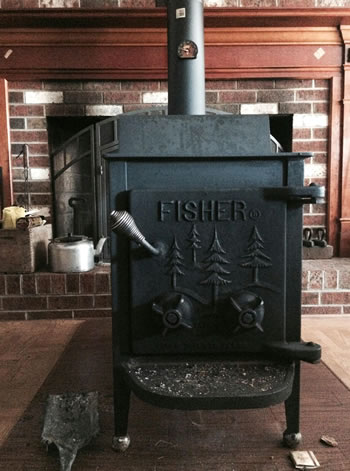6 Inch Double Wall Stove Pipe Selkirk
8 Inch Double Wall Stove Pipe Selkirk
Clearance Requirements from
Combustible Walls & Ceilings
6 - 8 Inches
Selkirk 6 Inch Chimney Pipe Ultra Temp
Selkirk Chimney Pipe 8 Inch (Ultra-Temp / Sure-Temp Compatible)
Clearance Requirements from
Combustible Walls & Ceilings
Minimum of 2 Inches
Single and double-wall interior stovepipe for connecting wood stove or pellet stove to chimney.
Need Black Pellet Stove Pipe?
Look at our pellet
stove pipe page.
Wood Stove Pipe Knowledge Base
Stove Pipe Installation
Stovepipe connects the stove to the chimney. It is typically single walled and is available in several lengths and shapes.
- How much stove pipe?
- You must determine how much stovepipe you need. Measure the distance to the from where your stove will sit on the floor to the chimney opening in a wall or a ceiling. If the chimney opening is in a wall measure from the floor to the top of the opening and then measure the diameter of the hole.
- Subtract the 28 inches from the floor to ceiling measurement to accommodate the height of your stove. For rear venting stoves this is the height from floor to the top of the elbow off the back of the stove. The number you figured is the length of stovepipe you need.
- You will also need to know that a 90 degree elbow is about 8 inches tall and for each section of pipe you must subtract two inches from the length. Since each piece of pipe overlaps the installation of a pipe length is two inches less than when purchased.
- Which end is up?
- All stove pipe has a crimped end (male) and a non-crimped end (female). For straight pieces the end that has predrilled holes is the non-crimped female end. Stove pipe is designed so the male end always points towards the stove. Any condensation and build up inside the pipe will flow harmlessly back to the stove, rather than leak out into your home.
- In practice connecting two pipes together is a tight fit, but this is intentionally done for saftey. Check to see that both ends are truly round. If they are not you may need a friend or rubber mallet to help squeeze the pipes together. When the pipes are connected, used the predrilled holes as a guide to drill a 1/8 inch hole in the crimped end of the mating pair and secure with the four screws.
- Stove Pipe Clearance
- For all single wall stove pipe the minimum clearance to combustible material is 18 inches. The minimum clearance may be reduced by 50% to 9 inches if suitable heat shielding is installed on the pipe or on the combustible material. We offer single wall stove pipe in 24 and 22 gauge. The lower the gauge the more durable the pipe is. Duravent stove pipe reduces wall clearances to 6 inches and ceiling clearances to 8 inches. Selkirk stove pipe reduces stove pipe clearances to 6 inches for walls and ceilings.
Other Questions About Stove Pipe
1. How do I determine
what size stove pipe I need?
2. What's
the difference between single wall and double wall stove
pipe?
3. Should stove
pipe be installed with the male end up or down?
4. What do gauges in stovepipe stand for?
A Few Words To The Wise
1. Stick with one brand of stovepipe for connecting woodstoves to chimney.
This ensures the most secure stovepipe connection. Learn
why a good stovepipe connection is so important.
2. For most stovepipes 3 screws are required to fit each
pipe connection tightly
3. New stovepipe and woodstove instalations may smoke a
little and emit an odor when first used. This is normal
curing of the paint on the pipe. Allow ventalation of an
open a window or door to allow the smoke and fumes to escape
during the beginning of your first wood burning stove fire.


